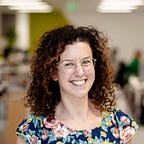“For every complex problem, there is an answer that is clear, simple, and wrong” — HL Mencken
This week, we had our final CPI team meeting for 2020. To begin, we were asked to share what we were most proud of this year. People offered lovely reflections — “becoming a mother”; “growing closer with my partner”; “joining a new team and building relationships despite never having met anyone in person.”
As I listened to people speak, I wasn’t sure what I was going to say. When it came to my turn to share, I went with what felt right at that moment. I shared that I feel proud of having spent this year accepting, navigating, and holding the uncertainty that is created by complexity.
COVID has created enormous uncertainty this year at so many levels. But this piece is a personal one, so I’ll focus on the uncertainty that it created for me.
A key reason we decided to come back to Australia this year was because we wanted to be with our family again. We wanted our kids to be developing strong bonds with their grandparents and cousins. We wanted to see our nieces and nephews growing up. We wanted to spend Friday nights having Shabbat dinner with my grandparents — both well into their 90s. But six weeks after we returned, Melbourne shut down, and all of that became impossible.
From March, when restrictions hit, almost all of the conversations I had were centred around questions like, “When will this end? When will we be able to travel more than 5km? When will we be able to have dinner at each other’s houses? When will I be able to give you a hug?”
Initially I wanted to find answers. To say, “well… based on what’s happening in other parts of the world, I think”; or “the modelling suggests that…”. But I soon realised that was unhelpful. COVID was unprecedented and too complex for these kinds of answers. We had to avoid projecting or speculating about what might be, because I could see the way that this created a sense of frustration and disappointment when our speculations didn’t translate to what emerged.
So, I shifted my language and thinking to a framing that much better suited the scenario we were confronting. I started to say, “I don’t know.” It sounds so obvious, but there was enormous power in this — both for me personally, and for those around me who I shared this with. By saying I don’t know, I was practicing acceptance. Rather than judging what was happening, or trying to control it, I focused on working with it — acknowledging the discomfort it was causing, but not fighting it. This helped. A lot.
In addition to COVID creating a sense of uncertainty, I’ve also recently had to make a difficult decision in relation to my Parkinson’s disease. A couple of months ago, the doctor recommended that I start taking a stronger medication, which has a known (and unavoidable) side effect, which can only be treated through brain surgery. Once you start this medication, you can’t come off it. So, by starting this medication I’m setting off down a path that, at this moment in time, ends in brain surgery.
I had to make a decision about whether to take this medication not knowing: how/if it would effectively address my symptoms; when the side effects might manifest, and how severely; what treatment options might be available to me when I do need to take a decision about what to do next. This was a decision characterised by many known unknowns, and almost certainly some unknown unknowns too. A hard decision, and one which couldn’t be guided by analysis or evidence because each case of Parkinson’s is so unique — and complex!
The only way I could make a decision was to draw on my values, and the views and perspectives of people who know and love me most. There was no objective right answer. There was only a right answer for me, for now.
And so, I’ve decided to take the medication. To follow the advice of the doctor who said, “live your best life now because if this year has taught us anything, it’s that we don’t know what’s around the corner.”
Over the course of this year, I’ve found myself often deeply uncomfortable with the uncertainty I’ve been confronting, and wanting to find answers (that don’t exist) and seeking to create (false) structures to create a greater sense of control. I’ve worked really hard on recognising this, and consciously leaning away from it, into the discomfort of embracing the reality of not knowing.
While this post is personal, it also connects to my work. Because what we do at the Centre for Public Impact is ask people in and around government to acknowledge and hold complexity, and lean into the not knowing. This year has confirmed for me just how hard this is. But it’s also convinced me of the power and absolute necessity of this approach.
Back in 2017, Bill Below of the OECD said,
“Today, the world seems to be suffering from complexity fatigue, whose symptoms are a longing for simple answers and a world free of interdependencies, with clear voices that ‘tell it like it is’, a world with lines drawn, walls built and borders closed. Bringing back a sense of excitement and purpose in mastering complexity may be the first ‘wicked’ problem we should tackle…”
Can we master complexity? I think not. That seems to miss the point. But what this quote does do is very neatly summarise where we are, why it’s not helpful, and what we should be working towards.
As we close 2020 and open 2021, I hope to welcome in a year where I hear more people saying, “I don’t know”.
